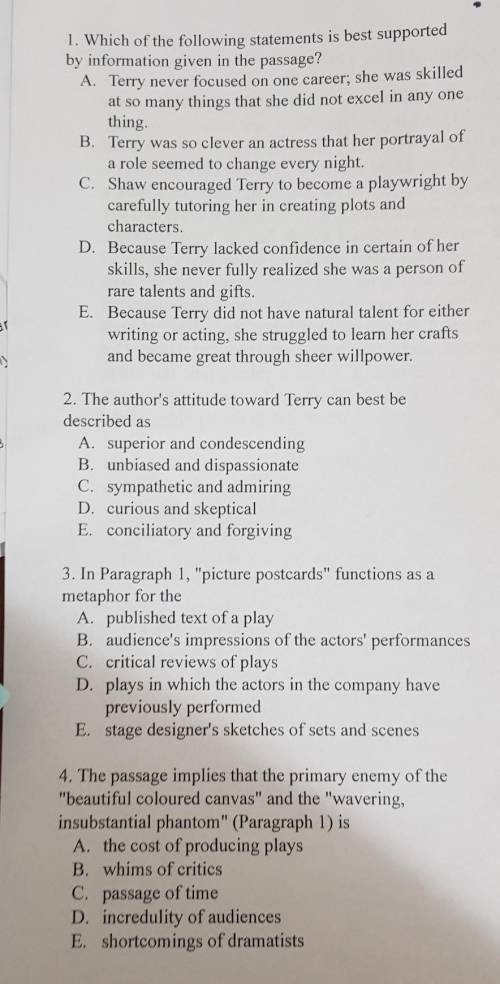Answer this following questions with explanation based on this passage.
It is the fate of...

English, 17.02.2020 22:38 smithmekayla
Answer this following questions with explanation based on this passage.
It is the fate of actors to leave only picture postcards behind them. Every night when the curtain goes down the beautiful coloured canvas is rubbed out. What Line remains is at best only a wavering, insubstantial phantom-a verbal life on the lips of the living. Ellen Terry was well aware of it. She tried herself, overcome by the greatness of Irving as Hamlet and indignant at the caricatures of his detractors, to describe what she remembered. It was in vain. She dropped her pen in despair. "Oh God, that I were a writer!" she cried, "Surely a writer could not string words together about Henry Irving's Hamlet and say nothing, nothing." It never struck her, humble as she was, and obsessed by her lack of book learning. that she was, among other things, a writer. It never occurred to her when she wrote her autobiography, or scribbled page after page to Bernard Shaw late at night, dead tired after a rehearsal, that she was "writing." The words in her beautiful rapid hand bubbled off her pen. With dashes and notes of exclamation she tried to give them the very tone and stress of the spoken word. It is true, she could not build a house with words, one room opening out of another, and a staircase connecting the whole. But whatever she took up became in her warm, sensitive grasp a tool. If it was a rolling-pin, she made perfect pastry. If it was a carving knife, perfect slices fell from the leg of mutton. If it were a pen, words peeled off, some broken, some suspended in mid-air, but all far more expressive than the tappings of the professional typewriter.


Answers: 1


Another question on English

English, 21.06.2019 18:40
Which of these are central ideas of chapter 4 of wheels of change? check all that apply.
Answers: 1

English, 22.06.2019 00:00
Describe the term romanticism. how is it evident in the poems of the era? be sure to include information related to poems from at least two authors. support your response with evidence related to form, sound, structure, and other poetic elements.
Answers: 3

English, 22.06.2019 00:30
"the children's hour" by henry wadsworth longfellow between the dark and the daylight, when the night is beginning to lower, comes a pause in the day's occupations, that is known as the children's hour. i hear in the chamber above me the patter of little feet, the sound of a door that is opened, and voices soft and sweet. from my study i see in the lamplight, descending the broad hall stair, grave alice, and laughing allegra, and edith with golden hair. a whisper, and then a silence: yet i know by their merry eyes they are plotting and planning together to take me by surprise. a sudden rush from the stairway, a sudden raid from the hall! by three doors left unguarded they enter my castle wall! they climb up into my turret o'er the arms and back of my chair; if i try to escape, they surround me; they seem to be everywhere. they almost devour me with kisses, their arms about me entwine, till i think of the bishop of bingen in his mouse-tower on the rhine! do you think, o blue-eyed banditti, because you have scaled the wall, such an old mustache as i am is not a match for you all! i have you fast in my fortress, and will not let you depart, but put you down into the dungeon in the round-tower of my heart. and there will i keep you forever, yes, forever and a day, till the walls shall crumble to ruin, and moulder in dust away! which literary device does longfellow use most frequently in the poem? a. simile b. metaphor c. repetition d. personification
Answers: 2

English, 22.06.2019 00:30
"the children's hour" by henry wadsworth longfellow between the dark and the daylight, when the night is beginning to lower, comes a pause in the day's occupations, that is known as the children's hour. i hear in the chamber above me the patter of little feet, the sound of a door that is opened, and voices soft and sweet. from my study i see in the lamplight, descending the broad hall stair, grave alice, and laughing allegra, and edith with golden hair. a whisper, and then a silence: yet i know by their merry eyes they are plotting and planning together to take me by surprise. a sudden rush from the stairway, a sudden raid from the hall! by three doors left unguarded they enter my castle wall! they climb up into my turret o'er the arms and back of my chair; if i try to escape, they surround me; they seem to be everywhere. they almost devour me with kisses, their arms about me entwine, till i think of the bishop of bingen in his mouse-tower on the rhine! do you think, o blue-eyed banditti, because you have scaled the wall, such an old mustache as i am is not a match for you all! i have you fast in my fortress, and will not let you depart, but put you down into the dungeon in the round-tower of my heart. and there will i keep you forever, yes, forever and a day, till the walls shall crumble to ruin, and moulder in dust away! which literary device does longfellow use most frequently in the poem? a. simile b. metaphor c. repetition d. personification
Answers: 2
You know the right answer?
Questions

Mathematics, 08.04.2020 18:51



Mathematics, 08.04.2020 18:51


English, 08.04.2020 18:51



Mathematics, 08.04.2020 18:51



History, 08.04.2020 18:51

Mathematics, 08.04.2020 18:51

Biology, 08.04.2020 18:51



History, 08.04.2020 18:51


Mathematics, 08.04.2020 18:51



